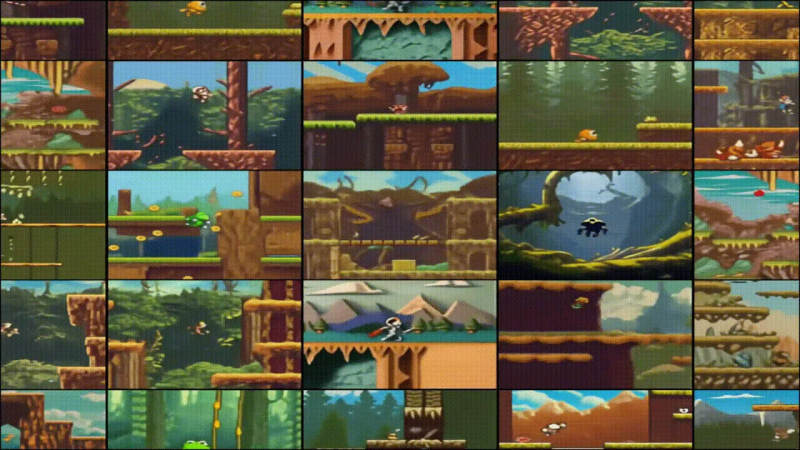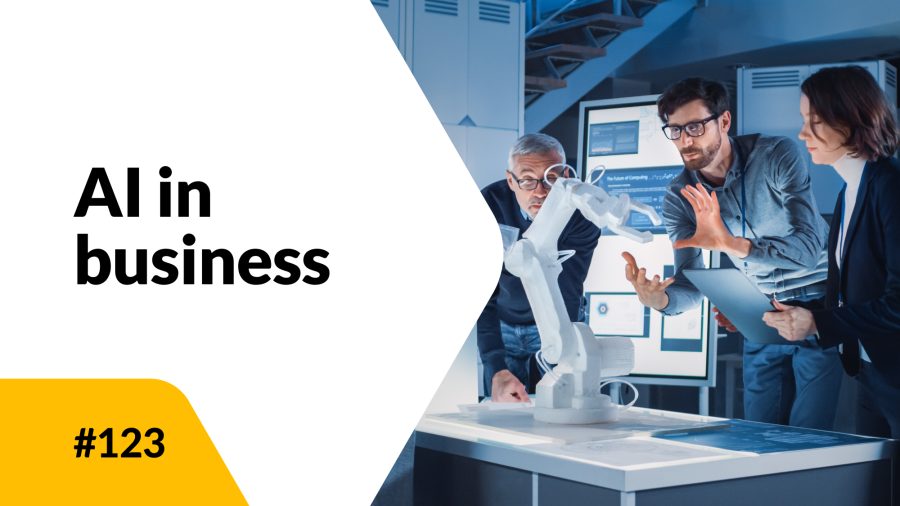Imagine a futuristic scenario in which an advanced artificial intelligence system brings to life any image, photo, or even a handwritten sketch, transforming it into a fully playable, interactive virtual reality. Amazing, right? And yet the technology already exists. It’s called Google Genie, and it’s a breakthrough AI model that could change the face of the gaming industry, AI system training, and even robotics. Want to know the details of this sensational innovation? Read on.
Google Genie – table of contents
What is Google Genie?
Google Genie (https://sites.google.com/view/genie-2024/) is a foundational world model developed by DeepMind. It is a generative AI model trained on over 30,000 hours of publicly available 2D platformer video game footage. Its key feature is the ability to generate fully interactive, playable environments directly from single images, photos and even hand-drawn sketches.

Source: Genie: Generative Interactive Environments (https://arxiv.org/abs/2402.15391)
How is this possible? Genie uses an unsupervised learning technique in the process of acquiring the ability to precisely control the environment based solely on video footage. No human action tagging is required. Using a special action coding module, it captures subtle changes between successive video frames and maps them to internal representations of motion, such as jumping or turning left. The dynamics model then generates the next frame in the sequence based on the coded actions.
As a result, Genie can create fully controllable, interactive game environments from any visual data. Each player movement generates a new, unique frame in real time, creating a smooth, playable session. This is a really big innovation that allows us to create entire interactive worlds from images or text.
Why is Genie innovative?
The Genie’s innovation lies in combining several key elements in a single model:
- generative video models, such as Phenaki (https://phenaki.video/), TECO (https://wilson1yan.github.io/teco/) or maskvit (https://arxiv.org/abs/2206.11894), which can predict future frames of a sequence based on input frames and text, but do not offer active control capabilities,
- world models that focus on predicting future environmental states based on an agent’s actions, but requiring data provided by humans,
- unsupervised learning, which allows Genie to learn both environmental dynamics and action space from raw video data alone, without human action labels.
Although each of these areas has been explored before, Genie is the first model to combine them to learn controllable environments directly from video footage. This unprecedented approach to teaching models without human supervision is a key innovation of Genie. It opens the door to using the vast amount of video available on the Internet as a training source for AI models, and breaks down the barriers associated with the limited availability of labeled data.
The combination of generative video models, world models and unsupervised learning in a single solution represents a fundamental advance in the development of artificial intelligence. Genie demonstrates that advanced AI systems can learn complex behaviors and environments directly from unstructured data, without manual tagging. This is a key step on the road to achieving true Artificial General Intelligence (AGI).

Source: Google Genie (https://sites.google.com/view/genie-2024/)
Potential applications of Google Genie
Google Genie’s capabilities go far beyond generating video games. This pioneering AI model can find applications in many fields:
- tool for animators – just upload an image, sketch or short text description and Genie will generate a consistent animation,
- unlimited training resource for AI agents – with its ability to generalize to entirely new domains, Genie offers an infinite pool of challenges on which future AI systems can learn. The lack of diverse training environments has so far been one of the key barriers to the development of generic AI agents,
- physical simulations for robotics – research has shown that Genie is able not only to control virtual robots, but also to realize the physical properties of deformable objects. This could have huge implications for the development of robotics and physical simulations,
- applications in the creative industries – Genie can facilitate the creation of interactive art installations, virtual exhibitions or films. Simply upload a sketch and the model will generate a fully controllable 3D world, ready for exploration.
However, the potential challenges and limitations of this technology should not be overlooked. At the current stage of development, Genie works best in narrow domains such as 2D platform games. Scaling up to more complex 3D environments will require additional research and optimization. In addition, there is a risk that this technology could be abused to create harmful or dangerous content. It is therefore critical to develop a robust ethical and legal framework to govern the development and use of such AI models.

Source: Google Genie (https://sites.google.com/view/genie-2024/)
Summary
By enabling the creation of fully interactive environments directly from visual data, without the need to manually tag actions,, Google Genie represents a true breakthrough in generative artificial intelligence. This fundamental world model gives the power to express imagery in the form of playable virtual realities that can be explored and controlled by a human or AI agent.
Genie’s potential is enormous – from tools for game developers, to an unlimited source of training data for AI, to physical simulations for robotics. It’s also an important step on the road to AGI. As models like Genie continue to evolve, the boundary between the real and virtual worlds is becoming more fluid.

If you like our content, join our busy bees community on Facebook, Twitter, LinkedIn, Instagram, YouTube, Pinterest, TikTok.
Author: Robert Whitney
JavaScript expert and instructor who coaches IT departments. His main goal is to up-level team productivity by teaching others how to effectively cooperate while coding.
AI in business:
- Threats and opportunities of AI in business (part 1)
- Threats and opportunities of AI in business (part 2)
- AI applications in business - overview
- AI-assisted text chatbots
- Business NLP today and tomorrow
- The role of AI in business decision-making
- Scheduling social media posts. How can AI help?
- Automated social media posts
- New services and products operating with AI
- What are the weaknesses of my business idea? A brainstorming session with ChatGPT
- Using ChatGPT in business
- Synthetic actors. Top 3 AI video generators
- 3 useful AI graphic design tools. Generative AI in business
- 3 awesome AI writers you must try out today
- Exploring the power of AI in music creation
- Navigating new business opportunities with ChatGPT-4
- AI tools for the manager
- 6 awesome ChatGTP plugins that will make your life easier
- 3 grafików AI. Generatywna sztuczna inteligencja dla biznesu
- What is the future of AI according to McKinsey Global Institute?
- Artificial intelligence in business - Introduction
- What is NLP, or natural language processing in business
- Automatic document processing
- Google Translate vs DeepL. 5 applications of machine translation for business
- The operation and business applications of voicebots
- Virtual assistant technology, or how to talk to AI?
- What is Business Intelligence?
- Will artificial intelligence replace business analysts?
- How can artificial intelligence help with BPM?
- AI and social media – what do they say about us?
- Artificial intelligence in content management
- Creative AI of today and tomorrow
- Multimodal AI and its applications in business
- New interactions. How is AI changing the way we operate devices?
- RPA and APIs in a digital company
- The future job market and upcoming professions
- AI in EdTech. 3 examples of companies that used the potential of artificial intelligence
- Artificial intelligence and the environment. 3 AI solutions to help you build a sustainable business
- AI content detectors. Are they worth it?
- ChatGPT vs Bard vs Bing. Which AI chatbot is leading the race?
- Is chatbot AI a competitor to Google search?
- Effective ChatGPT Prompts for HR and Recruitment
- Prompt engineering. What does a prompt engineer do?
- AI Mockup generator. Top 4 tools
- AI and what else? Top technology trends for business in 2024
- AI and business ethics. Why you should invest in ethical solutions
- Meta AI. What should you know about Facebook and Instagram's AI-supported features?
- AI regulation. What do you need to know as an entrepreneur?
- 5 new uses of AI in business
- AI products and projects - how are they different from others?
- AI-assisted process automation. Where to start?
- How do you match an AI solution to a business problem?
- AI as an expert on your team
- AI team vs. division of roles
- How to choose a career field in AI?
- Is it always worth it to add artificial intelligence to the product development process?
- AI in HR: How recruitment automation affects HR and team development
- 6 most interesting AI tools in 2023
- 6 biggest business mishaps caused by AI
- What is the company's AI maturity analysis?
- AI for B2B personalization
- ChatGPT use cases. 18 examples of how to improve your business with ChatGPT in 2024
- Microlearning. A quick way to get new skills
- The most interesting AI implementations in companies in 2024
- What do artificial intelligence specialists do?
- What challenges does the AI project bring?
- Top 8 AI tools for business in 2024
- AI in CRM. What does AI change in CRM tools?
- The UE AI Act. How does Europe regulate the use of artificial intelligence
- Sora. How will realistic videos from OpenAI change business?
- Top 7 AI website builders
- No-code tools and AI innovations
- How much does using AI increase the productivity of your team?
- How to use ChatGTP for market research?
- How to broaden the reach of your AI marketing campaign?
- "We are all developers". How can citizen developers help your company?
- AI in transportation and logistics
- What business pain points can AI fix?
- Artificial intelligence in the media
- AI in banking and finance. Stripe, Monzo, and Grab
- AI in the travel industry
- How AI is fostering the birth of new technologies
- The revolution of AI in social media
- AI in e-commerce. Overview of global leaders
- Top 4 AI image creation tools
- Top 5 AI tools for data analysis
- AI strategy in your company - how to build it?
- Best AI courses – 6 awesome recommendations
- Optimizing social media listening with AI tools
- IoT + AI, or how to reduce energy costs in a company
- AI in logistics. 5 best tools
- GPT Store – an overview of the most interesting GPTs for business
- LLM, GPT, RAG... What do AI acronyms mean?
- AI robots – the future or present of business?
- What is the cost of implementing AI in a company?
- How can AI help in a freelancer’s career?
- Automating work and increasing productivity. A guide to AI for freelancers
- AI for startups – best tools
- Building a website with AI
- OpenAI, Midjourney, Anthropic, Hugging Face. Who is who in the world of AI?
- Eleven Labs and what else? The most promising AI startups
- Synthetic data and its importance for the development of your business
- Top AI search engines. Where to look for AI tools?
- Video AI. The latest AI video generators
- AI for managers. How AI can make your job easier
- What’s new in Google Gemini? Everything you need to know
- AI in Poland. Companies, meetings, and conferences
- AI calendar. How to optimize your time in a company?
- AI and the future of work. How to prepare your business for change?
- AI voice cloning for business. How to create personalized voice messages with AI?
- Fact-checking and AI hallucinations
- AI in recruitment – developing recruitment materials step-by-step
- Midjourney v6. Innovations in AI image generation
- AI in SMEs. How can SMEs compete with giants using AI?
- How is AI changing influencer marketing?
- Is AI really a threat to developers? Devin and Microsoft AutoDev
- AI chatbots for e-commerce. Case studies
- Best AI chatbots for ecommerce. Platforms
- How to stay on top of what's going on in the AI world?
- Taming AI. How to take the first steps to apply AI in your business?
- Perplexity, Bing Copilot, or You.com? Comparing AI search engines
- ReALM. A groundbreaking language model from Apple?
- AI experts in Poland
- Google Genie — a generative AI model that creates fully interactive worlds from images
- Automation or augmentation? Two approaches to AI in a company
- LLMOps, or how to effectively manage language models in an organization
- AI video generation. New horizons in video content production for businesses
- Best AI transcription tools. How to transform long recordings into concise summaries?
- Sentiment analysis with AI. How does it help drive change in business?
- The role of AI in content moderation


















